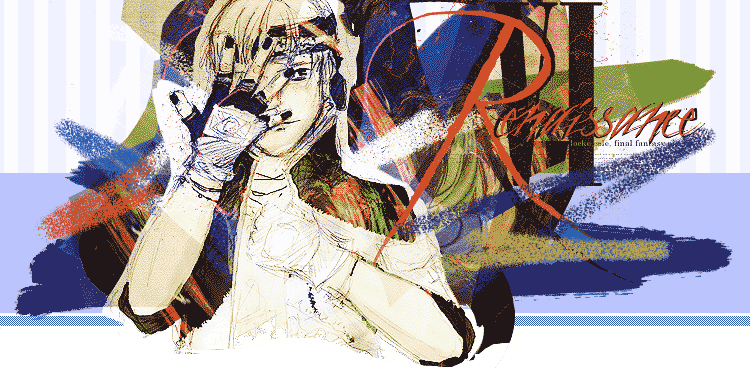
Lancelot
The Valiant Knife
One of the best things I've read in recent years are the Arthurian legends as recounted by Chrétien de Troyes. In Yvain, there's a moment when a knight is accosted by an ugly rustic. "What sort of man are you?" the rustic asks. The knight's response:
Je sui, çou vois, un cheveliers
Qui quier che que trouver ne puis;
Assés ai quis et riens ne truis
Roughly translated, this reads, "I am, as you see, a knight, who searches for that which cannot be found; long have I searched and I have found nothing." And that's proof that the whole chivarly thing has been the most glorious sort of fool's errand since 1177.
Locke's need to save women and protect them from danger is what I call his "Lancelot-complex." It's a defining part of his character and it motivates the story of Final Fantasy VI in countless ways. Without it, he probably wouldn't have rescued Celes, or agreed to take Terra to Edgar. He definitely wouldn't have formed such a deep bond with these two characters if he didn't feel as though it was his personal duty to protect them.
For all that though, his heroic insanity is the major flaw in his character. This is what I like about Locke: his vice is what's traditionally regarded as a virtue. The idea of Prince Charming has always been a noble one. But in Locke's case it has a clear cause and some obivously negative side effects.
When Locke abandoned Rachel, she died at the hands of the empire, with his name on her lips, no less. This results in his persistant mantra, "I couldn't protect her." The idea that Rachel is the origin of his need to play the hero is supported when Celes finds out about Rachel, she notes that it was Rachel Locke was saving when he rescued Celes, and Locke neither confirms nor denies this. Later on, however, he says something to that effect-
I wasn't able to save Rachel... I've lost all sense of purpose... My life will have no meaning until I can right this terrible wrong...
Nearly all of his actions since the day he found out Rachel died have been geared towards some sort of atonement. His fight with the empire is to avenge her death, his epic quest in search of the ultimate treasure, and his need to save both Terra and Celes, and act as their guardian. I do think Locke was reckless and adventure prone, and possibly gallant to a fault before the Rachel incident, but it wasn't until after that tragedy that he began to see women as nothing more than damsels in distress, as surrogate Rachel figures.
The entire game, from Locke's point of view, then isn't about saving the world from the Empire and Kefka, but about saving Rachel over and over, and really saving himself from himself, cliche as it may sound. Of course, Celes helps him do this, and their mutual attraction perhaps allows him to see beyond Rachel for a little bit. And her defiant independence and insistance that Locke should let her protect him for once probably went a ways towards rehabilitaiting him. But the real closure comes after Locke has embarked on his quest of atonement, his search for the ultimate treasure. When Rachel is momentarily revived, she tells him to move on with his life. He is not only forgiven, he was never to blame in the first place.
I'm okay... I feel lighter than air... From here on... I'll be all right.
Those words are his first words after Rachel gives him his life back, and frees him from his torturous quest. Do I think Locke is completely over Rachel, just like that? No. But I think that it's a good start, a real beginning. I've heard people complain that Locke's not good enough for their favorite female character because he's too overprotective, and doesn't see women as they really are. That's true to a point, but he's never what I would describe as sexist- just confused. And by the end of the game, Celes says "I've met someone who can accept me for what I am." She's undoubtably speaking of Locke, which should show you how much both characters have come during the course of the game.